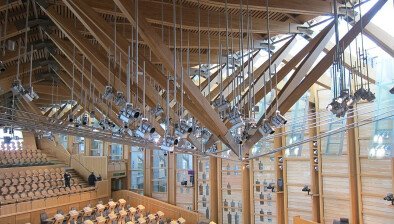Builders warn of housing activity slowdown ‘unless LBTT band is extended’
 Scotland’s home building industry is warning ministers of a drop in future housing market activity unless the Land and Buildings Transaction Tax (LBTT) band is extended.
Scotland’s home building industry is warning ministers of a drop in future housing market activity unless the Land and Buildings Transaction Tax (LBTT) band is extended.
Homes for Scotland (HFS) repeated its call for the extension of the current 5% band in order to address the ‘considerable drop’ in activity at the higher end of the property ladder as new figures revealed Revenue Scotland collected £55 million less than expected in receipts from LBTT.
The trade body said the drop has occurred as buyers either can’t afford it or consider the ‘perceived punitive nature’ of the tax and choose to stay put.
Nicola Barclay, chief executive of HFS, said feedback from its members “shows that the present system (which varies considerably from that south of the border) is creating significant barriers”.
“As we have expressed in submissions to the Scottish Government and Scottish Parliament, if we are to have a healthy and well-functioning housing market, we need a tax framework that enables movement up and down all price levels,” she said.
“Whilst in volume terms this may currently impact only a relatively small number of customers, the concern must be that, if aspirational buyers are unable or indeed choose not to move, this will create blockages lower down and place more pressure on the price of the fewer homes that do come on the market.
“Not only will this distort the market, it will also ultimately exacerbate the housing crisis. Clearly, this is not good news for the three quarters of Scots who wish to own their own home and will also only serve to put further pressure on the social and private rented sectors.
“Crucially, however, as we see from today’s Revenue Scotland report, LBTT also has a massive impact on the Budget and public finances. If the Scottish Government acts to boost activity at the higher end of the market, we believe it would result in a greater tax take than is being achieved at present.”
Analysis of the figures by the Scottish Property Federation (SPF), show that Scottish Government’s residential property revenue returned to pre-LBTT levels last month though commercial property tax revenue was critically low.
Revenues rose in August by £5.2m on July, to £52.8m. This was a jump of £11.6m on the same month in 2016, making it one of the highest total monthly revenues generated from LBTT since the tax came into effect in April 2015.
Residential revenue rose to £28.5m with the second homes tax, the additional dwelling supplement, bringing in £12.1m. If sustained, residential revenue for 2017 (not including the second homes tax) will surpass the £270m of residential revenue raised in the last year of SDLT for the first time since LBTT was introduced).
This improved revenue is a result of a recovery to pre-LBTT levels of sales of residential properties above £325,000, and a further rise in revenue from the Additional Dwellings Supplement ‘second homes’ tax.
LBTT revenue from commercial property sales rose for the first time in five months, standing at £12.5m. However, 2017/18 remains a poor year for commercial LBTT (£65.4m) as the total value of LBTT still lags behind 2016/17 (£67.7m) and 2015/16 (£71m).
David Melhuish, director of the Scottish Property Federation, said: “The Scottish Government will be pleased to see that over the summer tax revenues from higher value residential sales have returned to pre-LBTT levels. When added to the windfall generated by the second homes tax (ADS), it is clear the government will expect to reach its 2017-18 LBTT revenue targets, even if weighed down by below-par commercial LBTT figures.
“However, crucially, leading agents are reporting a significant fall in higher value properties coming to market - reducing economic activity and adding pressure on house prices.
“We strongly believe that if the 10% residential threshold in Scotland is raised from £325,000 to £500,000 we would see more tax transactions, which could further boost to both government revenues and market activity.
“Whilst the residential figures are showing signs of improvement, the SPF remains concerned that Scotland’s commercial property market sector continues to show low levels of transactions, particularly for investments above £5m. This is now affecting government revenues with commercial LBTT set to significantly under-shoot its forecasts for the second year running.”
A link to the SPF’s full report can be found here.

















